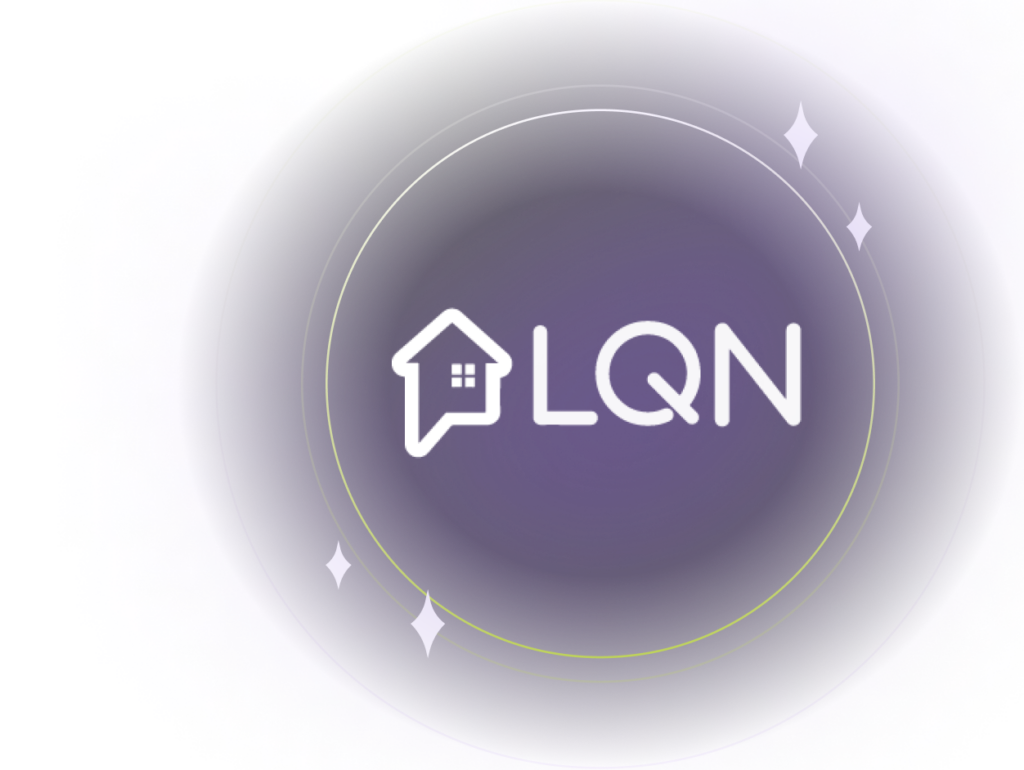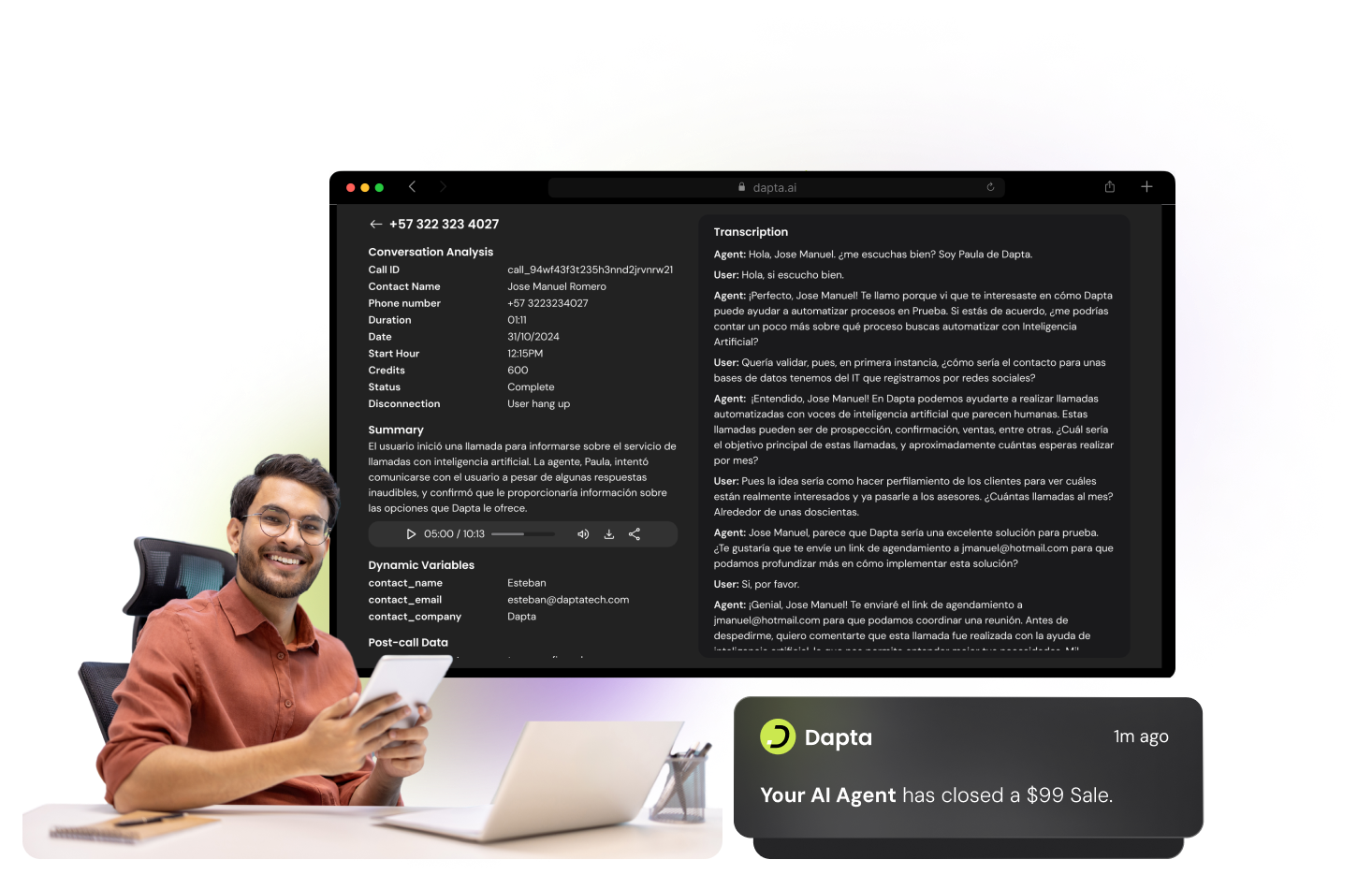La forma más rápida de con IA.
Creado para equipos de ventas, marketing y operaciones de PYMEs.

La IA de Dapta facilita la conexión con los clientes potenciales, la respuesta instantánea y el cierre de más tratos, de forma más rápida e inteligente.


Con la confianza de más de 20.000 empresas










Usa el poder de la IA a tu favor
Dapta ayuda a tu empresa a ahorrar tiempo, cerrar más ventas y crecer fácilmente con agentes de texto y voz.
Problemas resueltos
Tasa de contactabilidad
Leads calificados

La empresa hipotecaria LQN aprovechó el agente de IA de Dapta para contactar con el 100% de sus clientes potenciales con un 80% de ellos calificados.

No vuelvas a perder un deal
Nuestros agentes de IA llaman, envían mensajes y hacen seguimiento para agendar reuniones y cerrar ventas en piloto automático.

Prospectar y calificar clientes potenciales en segundos
Dapta conecta con tus clientes potenciales e identifica al instante a los compradores adecuados, para que puedas centrarte en cerrar tratos sin conjeturas.
-
Llega a los clientes potenciales al instante mediante mensajes de texto y llamadas.
-
Cualifica automáticamente los clientes potenciales utilizando tu lógica de ventas.
-
Sincroniza todo fácilmente con tu CRM.
Con Dapta, estamos cualificando clientes potenciales más rápida y eficazmente. La prospección instantánea y la perfecta sincronización con CRM nos ahorran tiempo y nos mantienen centrados en las oportunidades de alto valor.


Confirma y cierra pedidos sin esfuerzo
Dapta facilita la confirmación de los pedidos de los clientes y la finalización de los detalles, ahorrándote tiempo y reduciendo los errores para que puedas centrarte en hacer crecer tu negocio.
-
Confirma los pedidos al instante mediante mensajes de texto y llamadas.
-
Automatiza los seguimientos para ultimar los detalles rápidamente.
-
Sincroniza todas las actualizaciones de pedidos a la perfección con tu CRM.
Con Dapta, confirmar pedidos nunca ha sido tan fácil. Gestiona el seguimiento y los detalles finales automáticamente, lo que nos ahorra horas cada semana y garantiza que nuestros clientes estén siempre atendidos.»


Organiza reuniones al instante con tu agente de IA
Deja de perder el tiempo en programaciones de ida y vuelta. Deja que tu agente de IA gestione las reservas, envíe recordatorios y mantenga organizado tu calendario, para que puedas centrarte en hacer crecer tu negocio.
-
Reserva reuniones automáticamente mediante texto y agentes de IA.
-
Sincroniza las citas directamente con tu calendario.
-
Adapta la programación a la disponibilidad de tu calendario.
Con los agentes de IA de Dapta, la prospección nunca ha sido tan fácil. Llama a los clientes potenciales, los cualifica y programa automáticamente reuniones con mi equipo. Todo es perfecto, nos ahorra horas y hace que las ventas sean mucho más sencillas.


¿Por qué Dapta?
La plataforma de Dapta te permite convertir las ideas en realidad.

La IA simplificada
Herramientas fáciles para hacer crecer tu negocio.

Más de 1000 integraciones
Conéctate a tus apps y optimiza todos tus procesos.

Apoyo excepcional
Nuestro equipo está aquí para guiarte en cada paso del camino.
Escucha lo que nuestros agentes de IA pueden hacer por ti
Dapta ofrece conversaciones naturales y fluidas.Siempre listo, infinitamente fiable y construido para comprender, responder y actuar en tiempo real.
Lo que dicen de nosotros
"Dapta transformó completamente nuestros flujos de trabajo, ahorrándonos tiempo y aumentando la eficacia. No puedo recomendarlo lo suficiente".
Daniel Cardona
"Dapta ha sido increíble para automatizar nuestras tareas de marketing. Es fiable, eficiente y fácil de usar".
Aron D'mello
"Gracias a Dapta, nuestra agencia funciona mejor que nunca. La automatización de la generación de contenidos nos ha ahorrado mucho tiempo".
Alejandro Sarmiento
"Las herramientas de automatización de Dapta nos han cambiado las reglas del juego. Ahora son una parte esencial de nuestras operaciones diarias".
Sebastián B.
"El apoyo de Dapta ha sido excepcional. Hicieron que el proceso de integración fuera fluido para nuestro equipo."
Vladimir Raksha
"Dapta ha ayudado a agilizar nuestras interacciones con los clientes y a automatizar los flujos de trabajo clave, mejorando la eficiencia general".
David Grigoryan
"Con la IA de Dapta, hemos optimizado nuestros procesos de ventas y hemos impulsado la generación de clientes potenciales sin esfuerzo".
Andrew Hill
"Dapta ha hecho que automatizar nuestras tareas de marketing sea sencillo y eficaz. Ha supuesto un cambio total para nosotros".
Chenhong Daio
"Las herramientas de automatización de Dapta nos permitieron agilizar las operaciones en todos los ámbitos. Lo recomiendo encarecidamente a cualquier empresa en crecimiento".
Abhishek Gahlot
"Dapta ha revolucionado nuestra forma de gestionar la atención al cliente y la automatización de las ventas. Es una herramienta imprescindible".
María R.
"La eficacia de nuestro negocio se disparó tras integrar Dapta. La plataforma es fácil de usar e increíblemente eficaz".
Jeffrey Dalrymple
"La forma en que Dapta integra la IA en nuestros procesos es perfecta. Hemos ahorrado mucho tiempo y esfuerzo gracias a sus herramientas."
Santiago Ruiz
Pricing
Elige el plan que se ajuste a tus necesidades y presupuesto.
Experimenta el poder de la IA con nuestra cuenta gratuita.
- 1.000 Créditos
- 1 agente
- 2 flujos activos
- 1 usuario
- 1 proyecto
Para equipos pequeños y profesionales individuales.
- 20.000 créditos
- 2 agentes
- 4 flujos activos
- 1 usuario
- 1 proyecto
- Autoservicio
- Asistencia por correo electrónico
- 500 MB de almacenamiento de base de datos
Para empresas que desean ampliar sus operaciones.
- 100.000 créditos
- Agentes ilimitados
- Workflows Ilimitados
- 5 usuarios
- 5 proyectos
- Autoservicio
- Asistencia por correo electrónico y chat
- Prioridad de asistencia por chat
- 3 GB de almacenamiento de base de datos
Para empresas que REALMENTE quieren dar rienda suelta a la IA.
- 500.000 créditos
- Agentes ilimitados
- Flujos ilimitados
- Usuarios ilimitados
- 25 proyectos
- Servicio totalmente asistido
- Prioridad de asistencia por chat
- Asistencia 1-1 con el equipo técnico
- 20 GB de almacenamiento de base de datos
- Gestor de cuentas dedicado
Preguntas frecuentes sobre Dapta
¿Todavía tienes preguntas?
Los créditos en Dapta potencian funciones como las Llamadas AI, los agentes de texto y los chatbots. Cada interacción, ya sea una llamada, un mensaje de chat o la generación de contenidos, utiliza una pequeña cantidad de créditos. Puedes controlar el uso de créditos en tiempo real y añadir más fácilmente para que tus flujos de trabajo funcionen sin problemas.
¡Por supuesto! Dapta se integra con más de 300 herramientas de forma nativa y también puede conectarse a tus API favoritas. Ya sea tu CRM, tu plataforma de marketing por correo electrónico o tu herramienta de gestión de proyectos, Dapta te ayuda a crear flujos de trabajo fluidos sin esfuerzo.
¡Estamos aquí para ti 24 horas al día, 7 días a la semana! Ponte en contacto con nosotros en cualquier momento a través de support@daptatech.com o utiliza el chat en directo de nuestro sitio web. Nuestro equipo está dispuesto a ayudarte en todo lo que necesites.
Las Llamadas AI son llamadas telefónicas automatizadas e impulsadas por IA que se encargan de tareas como la cualificación de clientes potenciales, el seguimiento de clientes y la prospección. Estas llamadas suenan naturales, captan a tu audiencia de forma eficaz y ayudan a ahorrar a tu equipo horas de contacto manual.
El Chatbot de Dapta es un asistente con IA que interactúa con los clientes 24 horas al día, 7 días a la semana. Puede responder a preguntas frecuentes, captar clientes potenciales y guiar a los usuarios a través de tu embudo de ventas. Sus avanzadas capacidades conversacionales garantizan interacciones similares a las humanas que dejan una gran impresión.



